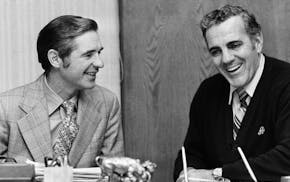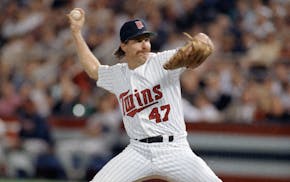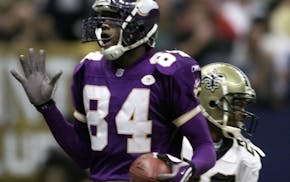Whenever the Lakers come to town to play the Timberwolves, as they did Thursday, I am reminded of the greatest time of my life and my memories of convincing Ben Berger and Morris Chalfen to buy the Detroit Gems franchise for $15,000 and move it to Minneapolis to become the Minneapolis Lakers.
Yes, Max Winter had the title of president of the team, but he spent most of the basketball season in Hawaii and I called all the shots as a 26-year-old young man. Those moves led to the Lakers winning six NBA titles.
The Lakers got credit for only five of those because the National Basketball League and the Basketball Association of America merged and the basketball gods gave the title that first season to the BAA instead of the NBL.
In my days members of the sports staff also worked on publicity for the sports teams in town, and that's how I got permission from the editors to work with the Lakers.
If you don't believe it, here are portions of a story by the Los Angeles Times about the Lakers starting in Minneapolis. It was written by Jerry Crowe and published in 2009.
In exploring the roots of Southern California's most successful sports franchise, you start in Minneapolis, of course.
You start with Sid Hartman.
If not for the hubristic Hartman, a high school dropout and unapologetic homer of a sports columnist for the (Minneapolis) Star Tribune, there would be no Lakers.
They were his idea.
And not only that. In the Lakers' formative years in Minneapolis — well before they moved to Los Angeles in 1960 — the journalist moonlighted without title (or shame) as the Lakers' de facto general manager, playing a behind-the-scenes role in piecing together the parts that formed the NBA's first championship dynasty.
"Conflict of interest," Hartman says from his home outside Minneapolis, "wasn't important then."
It was in his civic champion's hat that Hartman, in 1946, suggested to a pair of local businessmen that they bring a professional sports team to the Twin Cities.
He persuaded Morris Chalfen, founder of the Holiday on Ice skating show, and Ben Berger, who owned a chain of movie theaters in Minnesota and North Dakota, to target a pro basketball franchise — with Hartman as their point man.
"I had no title," the columnist notes, "but the editor of the paper and the sports editor agreed that if I could get the first major league team for Minnesota, they'd let me be connected with it as long as I didn't write about it, so I didn't write about it."
In the summer of 1947, Hartman says, "I went to Detroit with a check in my hand. We bought the Gems for 15 grand." Later, in the so-called "Land of 10,000 Lakes," a naming contest determined that they would be rechristened the Lakers.
Hartman, relying on contacts in college basketball to help him make personnel decisions, hired the coach who would oversee the dynasty, John Kundla, and signed the players.
He played a more duplicitous role in the signing of George Mikan, the NBA's first great big man.
Enlisted to deliver Mikan to the airport after a day of failed negotiations, Hartman purposely took a wrong turn, causing the free agent to miss his flight. Forced to stay overnight, Mikan signed with the Lakers the next day and helped them win six championships in the next seven seasons, the last five in the NBA.
"I loved it," he says. "I've been with the newspaper 60-some years, but the most fun I had was that Laker thing."
The fun ended, he says, when Berger usurped Hartman's autonomy, the co-owner "sticking his nose in the whole thing" and torpedoing a trade that Hartman says would have put the Lakers in a position to draft Bill Russell.
"When that happened," Hartman says, "I quit."
In a 2006 book, "The Show: The Inside Story of the Spectacular Los Angeles Lakers in the Words of Those Who Lived It," author Roland Lazenby notes that it wasn't until decades later that Hartman revealed the full extent of his role with the Lakers, leaving some to wonder whether the newsman had exaggerated his involvement.
"Yet there is no doubt," Lazenby writes in the book, "that Hartman was the dealmaker who built the team."
After Mikan retired in 1956, the Lakers fell on hard times. Sold to Bob Short and Frank Ryan in 1957, they moved to Los Angeles — and into the Sports Arena — three years later.
Hartman never forgot.
"If we'd have made that Russell deal," Hartman says, "we'd have had the nucleus of another great team and Mr. [Red] Auerbach wouldn't have had his good streak. It would have changed the whole history of the NBA if that deal had gone through.
"The Lakers never would have moved to L.A., I'll tell you that."
And one other thing, Hartman adds.
"If we'd have got Russell," the Minneapolis sportswriting icon says, "I'd have quit the newspaper."
Coming back to the present day, it's now eight years after Crowe wrote that column, and I still look back at that Russell deal. That was before the 1956 draft. We had completed a deal with Boston where Vern Mikkelsen of the Lakers would have gone to the Celtics for three Kentucky college players, Frank Ramsey, Cliff Hagan and Lou Tsioropoulos, who were all in the service at Andrews Air Force Base. We would have finished in last place and would have had Russell as the No. 1 draft pick instead of him winding up with the Celtics.
It's amazing to think of how far the Lakers franchise has come since I helped lead the purchase of the club all those years ago.
From that original purchase price of $15,000, the Lakers were then sold for $150,000 in 1957 to a local group led by Bob Short, who moved the team to Los Angeles in 1960. Short sold it to Jack Kent Cooke for $5.5 million in 1965, and Cooke sold it to Jerry Buss, along with the Los Angeles Kings and the L.A. Forum, for $67.5 million in 1979. And this year Forbes listed the franchise's value at $3 billion. That's the second-highest franchise valuation in the NBA, trailing only the New York Knicks.
Yes, and with my thanks to Mr. Crowe for his column I would say I considered it a compliment that he called me hubristic. I've always had the confidence that I can report with the best.
Sid Hartman can be heard weekdays on 830-AM at 6:40, 7:40 and 8:40 a.m. and on Sundays at 9:30 a.m. sid.hartman@startribune.com

Sid Instant Replay from 1977: Vikings' Super Bowl loss to Raiders hurt the most

Read Sid's column from 1974, when Ara Parseghian left Notre Dame

Sid instant replay: No greater hero than Twins' Morris in World Series


![Andrew Wiggins (22) was defended by Corey Brewer (3) in the third quarter. ] CARLOS GONZALEZ ï cgonzalez@startribune.com - March 30, 2017, Minnea](https://arc.stimg.co/startribunemedia/TQQXHHYI4HAOJE3E6WPY5YW57I.jpg?w=600&h=600&auto=format%2Ccompress&cs=tinysrgb)